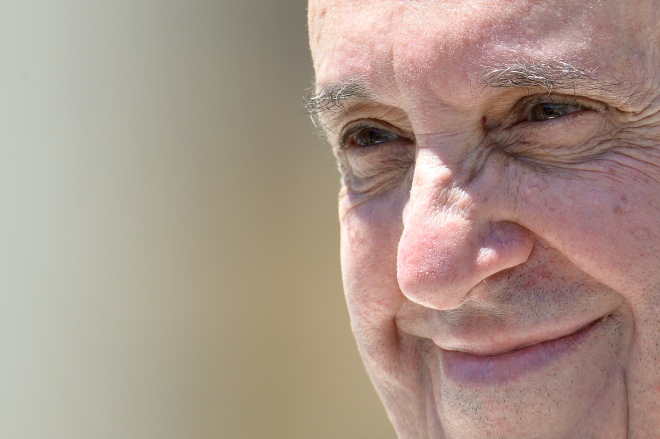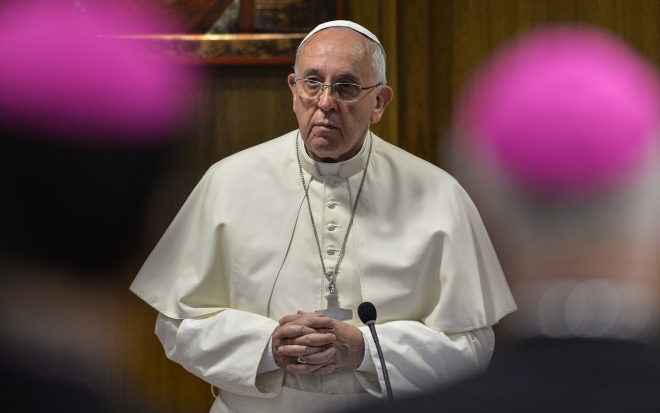There’s been quite a bit of pushback, as I predicted, to the revolutionary pastoral content of Pope Francis’ Synod on the Family. But what some are missing, I think, is that the word “pastoral” is critical here. It does not mean “doctrinal”. There is no indication that the Synod intends even to relax strictures against re-married Catholics from receiving Communion, let alone its formal doctrines about the impermissibility of any sexual intimacy or committed relationships for gay people for our entire lives. Instead, it seems to me, the Synod’s mid-term Relatio is arguing that insisting on these exclusions, and using harsh language to describe them – “living in sin”, “intrinsically disordered” etc – does nothing to bring people into a greater communion with the church and its teachings. In fact, the emphasis on such categories of the damned risks creating a smaller, more rigidly orthodox church, devoted to sustaining and revering certain doctrines, in ways that make evangelization effectively impossible. So, yes, this Synod is a response to the collapse of the church in the West – intellectually, morally and institutionally – under John Paul II and Benedict XVI.
The church right now is losing so many in their 20s and 30s, never to return, not because they have rejected the core teachings of Jesus, but because these stern strictures – coming from a hierarchy of celibates, child-abusers and their enablers – appall them in their rigidity, cruelty and indifference to the complex lives we fallible humans lead. A church that throws out a devoted couple of 43 years because they got a civil marriage license is a perfect emblem of that problem. So too are the abrupt firings of teachers in Catholic schools for the sin of pregnancy! When I asked recently if the Church has a future in America, this is what I was thinking of. And Pope Francis sees this so clearly. Rocco Palmo reminded us yesterday of previous words from Francis that help make sense of what is now happening:
I see clearly that the thing the church needs most today is the ability to heal wounds and to warm the hearts of the faithful; it needs nearness, proximity. I see the church as a field hospital after battle. It is useless to ask a seriously injured person if he has high cholesterol and about the level of his blood sugars! You have to heal his wounds. Then we can talk about everything else. Heal the wounds, heal the wounds…. And you have to start from the ground up.
“The church sometimes has locked itself up in small things, in small-minded rules. The most important thing is the first proclamation: Jesus Christ has saved you. And the ministers of the church must be ministers of mercy above all. The confessor, for example, is always in danger of being either too much of a rigorist or too lax. Neither is merciful, because neither of them really takes responsibility for the person. The rigorist washes his hands so that he leaves it to the commandment. The loose minister washes his hands by simply saying, ‘This is not a sin’ or something like that. In pastoral ministry we must accompany people, and we must heal their wounds.
“How are we treating the people of God? I dream of a church that is a mother and shepherdess. The church’s ministers must be merciful, take responsibility for the people and accompany them like the good Samaritan, who washes, cleans and raises up his neighbour. This is pure Gospel. God is greater than sin.
Notice that he seeks a balance between the “rigorist” of pure doctrinal judgment and the “lax” priest who abandons the teaching of the church. The point here is that the church has veered far too far in the direction of the rigorist after veering too far in the lax direction – and now needs mercy and listening and humility to re-engage those wounded or excluded or repelled by the recent past. And the way too many churches have treated gay people or divorced people or young cohabiting couples in the last three decades has been more like the Pharisees than Jesus.
But, of course, one also senses in Francis something that was very hard to discern in his predecessors and that places him more in the tradition of Cardinal Newman. It’s clear he believes that doctrine can develop, with new understandings of human nature. Here’s another passage from Francis on that very theme:
Human self-understanding changes with time and so also human consciousness deepens. Let us think of when slavery was accepted or the death penalty was allowed without any problem. So we grow in the understanding of the truth.
Exegetes and theologians help the church to mature in her own judgment. Even the other sciences and their development help the church in its growth in understanding. There are ecclesiastical rules and precepts that were once effective, but now they have lost value or meaning. The view of the church’s teaching as a monolith to defend without nuance or different understandings is wrong.
After all, in every age of history, humans try to understand and express themselves better. So human beings in time change the way they perceive themselves. It’s one thing for a man who expresses himself by carving the ‘Winged Victory of Samothrace,’ yet another for Caravaggio, Chagall and yet another still for Dalí. Even the forms for expressing truth can be multiform, and this is indeed necessary for the transmission of the Gospel in its timeless meaning.
[My italics.] I believe, for example, that we have grown in our understanding of what homosexuality is and who homosexual persons are. And yet the church – after accepting that the orientation is a given and blameless in 1975 – subsequently attempted to rein that understanding back, most notably in then-Cardinal Ratzinger’s brutal letter of 1986 and subsequent references to gay people as somehow inherently threats to the church. I just don’t think it’s possible, after reading and studying Francis’ own faith-journey and intellectual development, that he sees gay people that way. And so, while he will not change doctrine, he can still change the way gay people are treated pastorally, and declare that our gifts should be valued, our presence welcomed. That is the impact of the current shift.
At the same time, once you change the pastoral dimension, and see gay people as human, and our relationships as in many ways valuable and loving, I find it hard to believe the doctrine can remain unaltered in perpetuity. I think of how the church shifted its understanding of other faiths in the Second Council, or how it shed its still-resilient anti-Semitism in the same era. I don’t think this is Machiavellian, as Damon has it. And I don’t believe it is about “liberalization.”
I think it’s about truth – and how we humans can grow in our understanding of it through history. I think Francis is simply ahead of most of us, and patient with history and aware of how slowly and incrementally a church can change. He knows he will not live for ever. But the seeds he has sown – some on barren ground and some on fertile earth – will sprout and grow and transform us in the end. This, at least, is my faith: we grow in the understanding of the truth.
(Photo: Pope Francis smiles after his weekly general audience in St Peter’s square at the Vatican on June 12, 2013. By ALberto Pizzoli/AFP/Getty Images)

